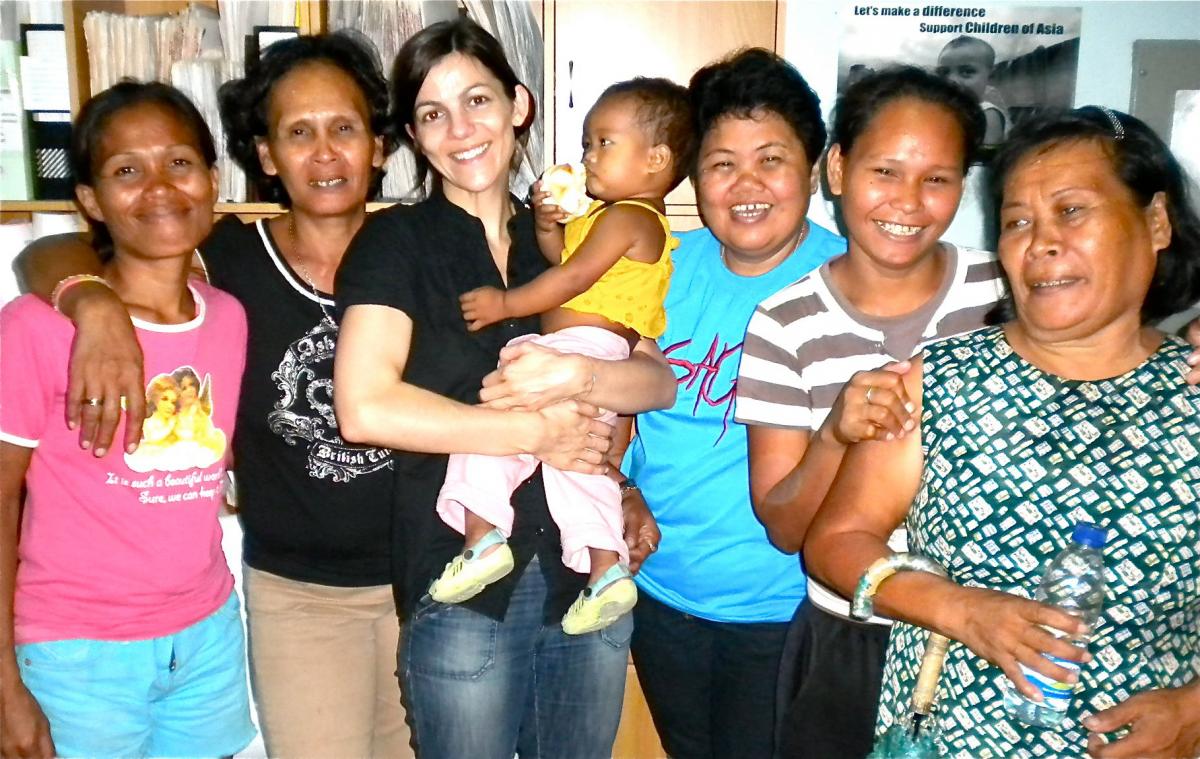 On the eve of International Women’s Day, I was in Cebu city, in the Philippines, working on behalf of the Paris-based humanitarian NGO Enfants d’Asie-CoA (Children of Asia). CoA provides comprehensive care—schooling, medical care, food aid, counseling, college scholarships and vocational training—for children from very poor communities in South-East Asia: in Cambodia, Vietnam, the Philippines and Laos.
On the eve of International Women’s Day, I was in Cebu city, in the Philippines, working on behalf of the Paris-based humanitarian NGO Enfants d’Asie-CoA (Children of Asia). CoA provides comprehensive care—schooling, medical care, food aid, counseling, college scholarships and vocational training—for children from very poor communities in South-East Asia: in Cambodia, Vietnam, the Philippines and Laos.
The organization has been providing schooling and medical care for children from a cemetery-slum near the association’s local office in Cebu. CoA implemented a food aid programme for the families and also opened a drop-in shelter, providing a safe space, equipped with electricity and sanitation and supervised by qualified social workers, where the children can play and study together after school.
After having lived in the Carreta cemetery for decades, the families have now been evicted. While living conditions in the cemetery-slum were far from ideal, this eviction throws the families into a more urgent and dire situation. Many of the mothers of the children in the CoA education programme were born in the cemetery over 30 years ago. Their children were born in the cemetery. Among the mothers’ greatest worries is their passionate concern to keep their children in school. These women did not themselves have the chance to complete their schooling: their parents could not afford to pay for their education and, because they were girls, they had to take care of their siblings and/or work with their parents.
In an effort to maintain the CoA education programmes, I met with several of the mothers from the cemetery, together with the local social workers of CoA. We visited the mausoleums in the cemetery where the families used to live. Then, back at the CoA office, we talked for several hours about the families’ current situations.
At four o’clock in the afternoon, the CoA office is alive with the chatter of a group of mothers and their younger children, who are huddling around the computer on which I’m typing, avidly curious. The atmosphere is convivial and the mothers, who are all friends from the cemetery where they were formerly neighbors, talk openly about their own family histories, their lives in the cemetery and their anxieties about how they will cope now that they can no longer live and work there.
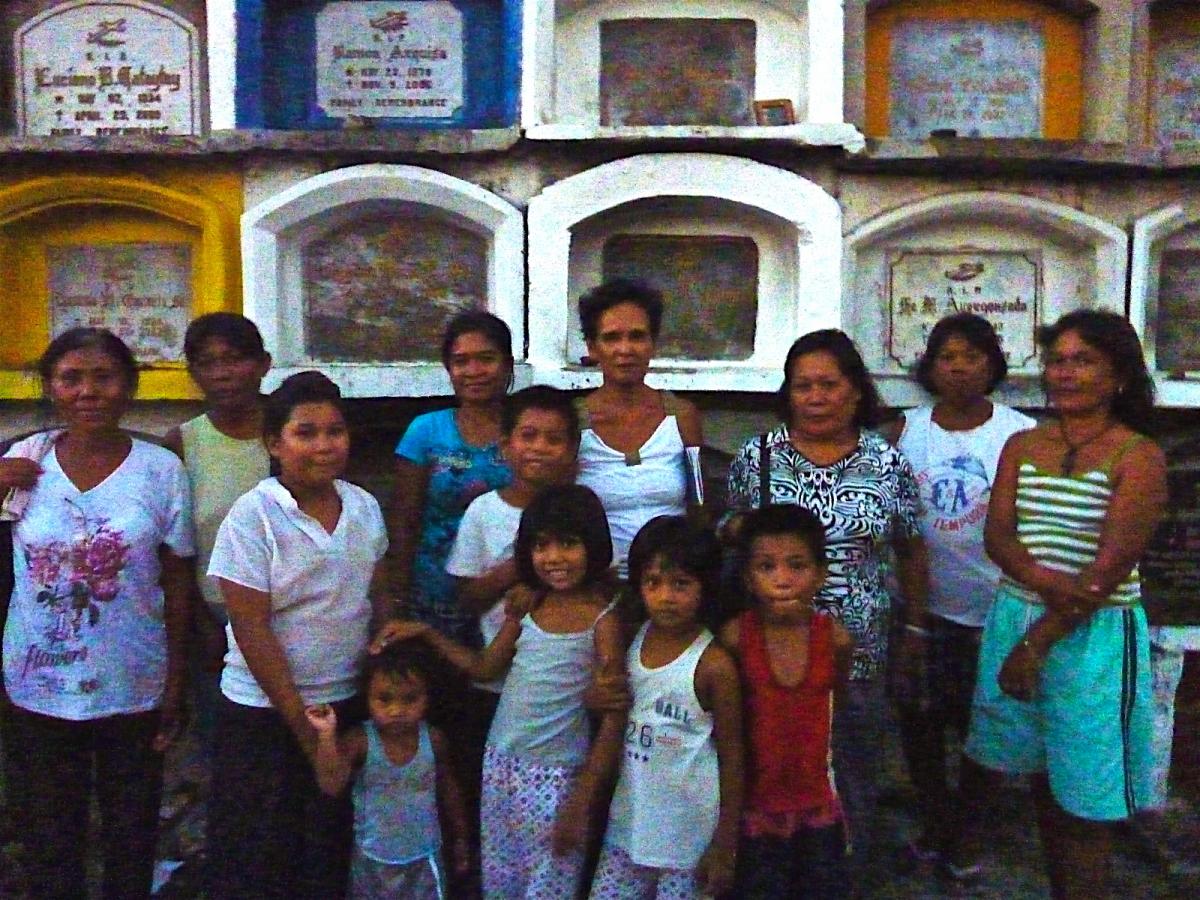 Although the cemetery had no running water, sanitation or electricity, it was the source of these families’ “livelihoods”, such as candle vending and cleaning the tombs. Ann’s livelihood is candle-making, which was also her mother’s occupation. Her husband engraves tombstones, as did his father. The families have been obliged to relocate to other slum areas nearby and are now struggling more than ever to earn vital revenue. Some families, such as Teresa’s family, have not found anywhere to go.
Although the cemetery had no running water, sanitation or electricity, it was the source of these families’ “livelihoods”, such as candle vending and cleaning the tombs. Ann’s livelihood is candle-making, which was also her mother’s occupation. Her husband engraves tombstones, as did his father. The families have been obliged to relocate to other slum areas nearby and are now struggling more than ever to earn vital revenue. Some families, such as Teresa’s family, have not found anywhere to go.
Vivencia explains that life was safer in the cemetery, where the inhabitants knew one another. Although she and her husband were never able to earn a fixed income from flower vending and tombstone engraving, they are now finding life beyond the cemetery extremely difficult. When I ask Vivencia what constituted good days in the cemetery, she tells me “burial days”, since there was more work on those days (also, after a funeral, there might be leftover food); bad days were “rainy days”, because then there were fewer visitors to the cemetery and therefore fewer opportunities for her to sell flowers.
As I discuss the current situtation with the mothers and reassure them that CoA will continue to support their children’s schooling, the mothers eagerly share their hopes that their children can go to college and talk about their children’s aspirations. Babie hopes that one of her children might attend university. Babie wishes that she had had the chance to become a school teacher, but she had to give up her schooling when she was 12 years old.
Thanks to education sponsorship programmes like those of CoA—which enable individuals to finance the education of a child or children from underprivileged communities, and to provide moral support through an exchange of correspondence—the children of the families from Carreta cemetery will have the opportunity to attend school, to obtain college degrees and/or vocational training, skills and employment.
Such education initiatives are crucial in the endeavour to break the cycle of poverty.
On International Women’s Day, Women’s Worldwide Web salutes the awe-inspiring resilience of the mothers from Carreta cemetery. We invite you to read interviews with some of the mothers and to contribute to the education programmes that are building positive prospects for the children and families who used to live in Carreta cemetery:
Interview with Ann della Cruz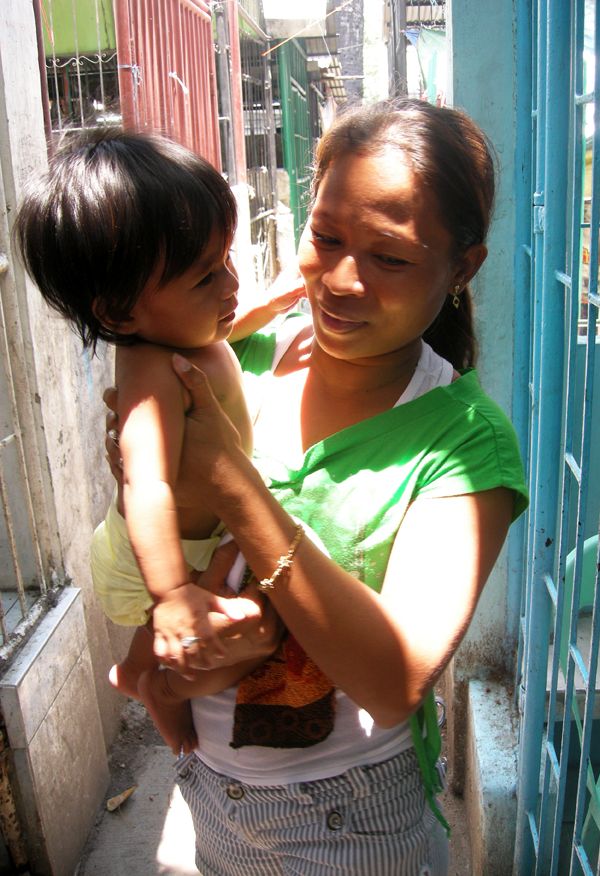
Ann is 33 years old. She is married and has two sons, Mark Juel, who is 12 years old and Jabie Matt, aged 1 year and 5 months.
Where were you born?
I was born in the north of Cebu.
How long have you been living in the cemetery?
I have been living in the cemetery for 20 years. I moved there to join my parents when I was 12 years old. Before that I lived with my Lola (grandmother) in the north of Cebu.
My parents came to the city when I was 8 years old because they could earn more money in the city. Before that, they worked as sugar cane laborers.
My parents worked in the cemetery. My father was a “lapida” maker (he engraved tombstones) and my mother was a candle maker.
Mark, my eldest son, was born in the cemetery. The midwife was from the NGO “Mercy in Action”. My second child was born at the hospital.
How many of your children attend school?
One, Mark Juel, is in elementary school. He will be in grade 5 in June. Mark is in the Children of Asia programme.
Did you go to school? If yes, until which grade?
I went to school. I completed High School.
What do you do to earn money and take care of your family?
I make candles and my husband engraves tombstones.
What is your home made of?
Until my family was evicted, I lived in one of the mausoleums in the cemetery.
Do you have access to
- Running water? NO
- Electricity? NO
- Sanitation? NO
Have you received any microfinance loans? If yes, how many and what was the amount?
Yes, I received 3 loans. The first one was 1,000 pesos and the other two were 2,000 pesos each.
How many months did you have to repay the loans?
For each loan, I had one month to repay and the interest rate was 1%.
{Ann fully repaid 3 loans. She took out a 4th loan of 2,000 pesos but has had difficulties repaying the loan because her family has been evicted from Carreta cemetery.}
What did you do with the loan money?
I used it to make and sell more candles.
How much do your candles cost?
70 pesos for 100 candles. People buy them and then retail them at 1 peso per candle.
Can you explain your budget? How much do you spend daily on food and water? How much is your income per month?
Before obtaining microfinance loans, my income was approximately 200 pesos per day, but it was not regular income. My husband and I earned approximately 2000 pesos per month ($46). The most my husband and I ever earned in one month was 4000 pesos.
Presently, it’s very difficult for us to earn an income.
Water is 30 pesos per container. For the family, we spend 75 pesos a day on food, on rice and meat.
Where do you get your clothes?
I buy second hand clothes and sometimes we are given clothes.
How many hours a day do you work?
From 7am to 5pm.
How has life changed since you left the cemetery?
My husband and I now rent a space near the Barangay (the local council) hall, which costs 900 pesos per month. The space is very small, a few square metres, smaller than the mausoleum in the cemetery.
It’s much more difficult for us now because we have to pay rent and we don’t always have income and our food is more expensive. Before, in the cemetery, we had some food from the funerals. Also, I’m afraid I can’t sell my candles in the cemetery anymore.
What was it like to live in the cemetery?
Living in the cemetery wasn’t difficult. We didn’t have to pay rent. Now it is hard for us. When we woke up in the cemetery, we would only have to think about getting our food.
Also, it was safer in the cemetery. We knew each other and had good relations with the other families.
Has Children of Asia helped you?
They help Mark to go to school and he goes to the Balay Bata (a drop-in shelter) every day after school.
Mark has improved at school. He has more friends. He studies more. He is less shy. He still comes to the Balay Bata (drop-in shelter) everyday {even though the family has been evicted from the cemetery}.
I would like Mark to finish his schooling, to go to college when he is older. I would like Jabie Matt to go to the daycare.
Could you describe a good day for you?
A good day is a sunny day. And Sundays and Mondays, which are visit days at the cemetery, so I can sell more candles.
Could you describe a bad day for you?
A bad day is a rainy day {because Ann earns less and can’t make candles}.
What is your biggest wish in life?
It is to have a house of my own. I have never had a house or a lot. I would like a stable home for my children.
What are your children’s wishes?
Mark would like to go to France. {Ann laughs. CoA is a Paris-based NGO.}
What is your best memory?
It is my wedding. I was 22 years old. I was so happy and relieved from the responsibilities at home. {Ann says she is still happily married and in love with her husband.} Each year, we celebrate our wedding anniversary at Sunday mass.
What is the nicest thing someone ever did for you or told you?
When my grandmother helped me to go to school: Lola gave my father some money so I could go to school. My father didn’t want me to go to school. He told me I had to take care of my siblings.
{Ann’s parents and grandmother worked as sugar cane laborers. Her parents would keep her out of school to take care of her siblings or work with them. Then Ann’s grandmother gave her father money to enable Ann to go to school. Ann cried when she told this story.}
I liked going to school. Often there wasn’t enough food at home. There wasn’t any food at school either, but I liked playing at school.
When I moved to the city, I attended night school for high school. I worked in the day as a nanny. I then worked as a quality controller in a garment factory.
Why did you stop that job?
My mother got sick, so I didn’t have anyone to take care of my child while I was working.
Teresa Sofocado 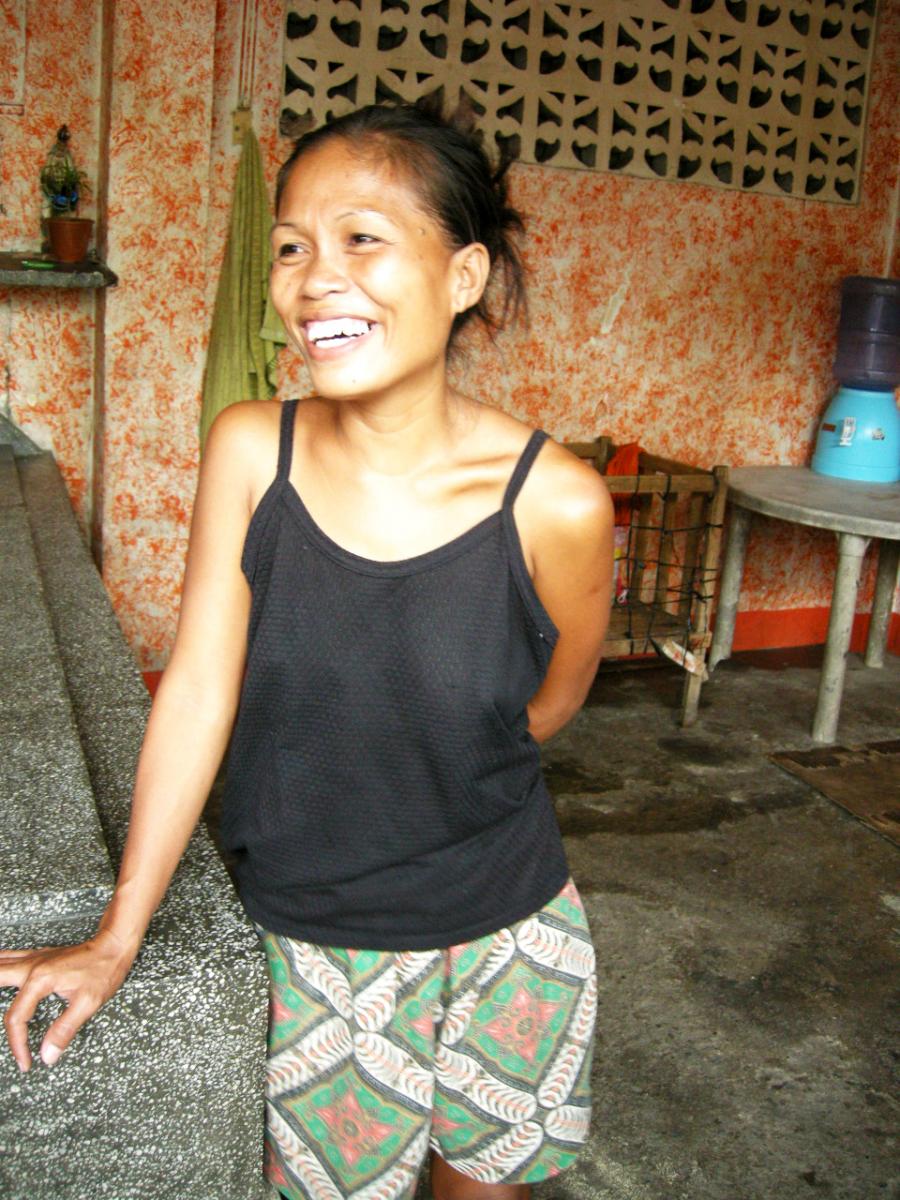
Teresa is 32 years old. She is married and the mother of five children: three girls and two boys. Her eldest child is 12 years old and her youngest child is a year old.
Where were you born?
I was born here in Cebu City, in the cemetery.
How long did you live in the cemetery?
I have been living in the cemetery for 32 years. I was born there. I still live in the cemetery. My partner and I don’t have the means to go elsewhere. We don’t have enough money to rent a space. My mother worked in the cemetery, vending candles. My mother was a single parent.
Did you go to school? If yes, until which grade?
I went to school ‘til grade 6, when I was 12 years old. I had to stop school because my mother didn’t have enough money to pay for my schooling.
What do you do to earn money and take care of your family?
My partner and I clean the tombstones.
What is your home made of?
I live in one of the mausoleums
Do you have access to
- Running water?NO
- Electricity? NO
- Sanitation? NO
How many of your children are in the CoA scholarship programme?
One of my children: my daughter, Leanfi, who is 12 years old. She is in grade 5.
Did you receive any micro-finance loans?
I received two loans. My first loan was 1000 pesos. I used it to buy a stock of candles and flowers, which I sold during the period of All Saints Day and I made 1000 pesos in profit.
I took out a second loan, which was also 1000 pesos. I wanted to use it to buy more supplies to sell at Sinulog (an annual festival held in January), but I had difficulties to repay the loan. I used some of the loan to pay for food.
Can you explain your budget? How much do you spend daily for food and water? How much is your income per month?
My income and my partner’s is not fixed. We can earn approximately 1500 pesos per month. When we have the money, we spend approximately 70 pesos on rice, dried fish, noodles, soap, and diapers.
Where do you get your clothes?
We are given clothes.
How many hours a day do you work?
I work from 7am to 5pm.
How has life changed since you left the cemetery?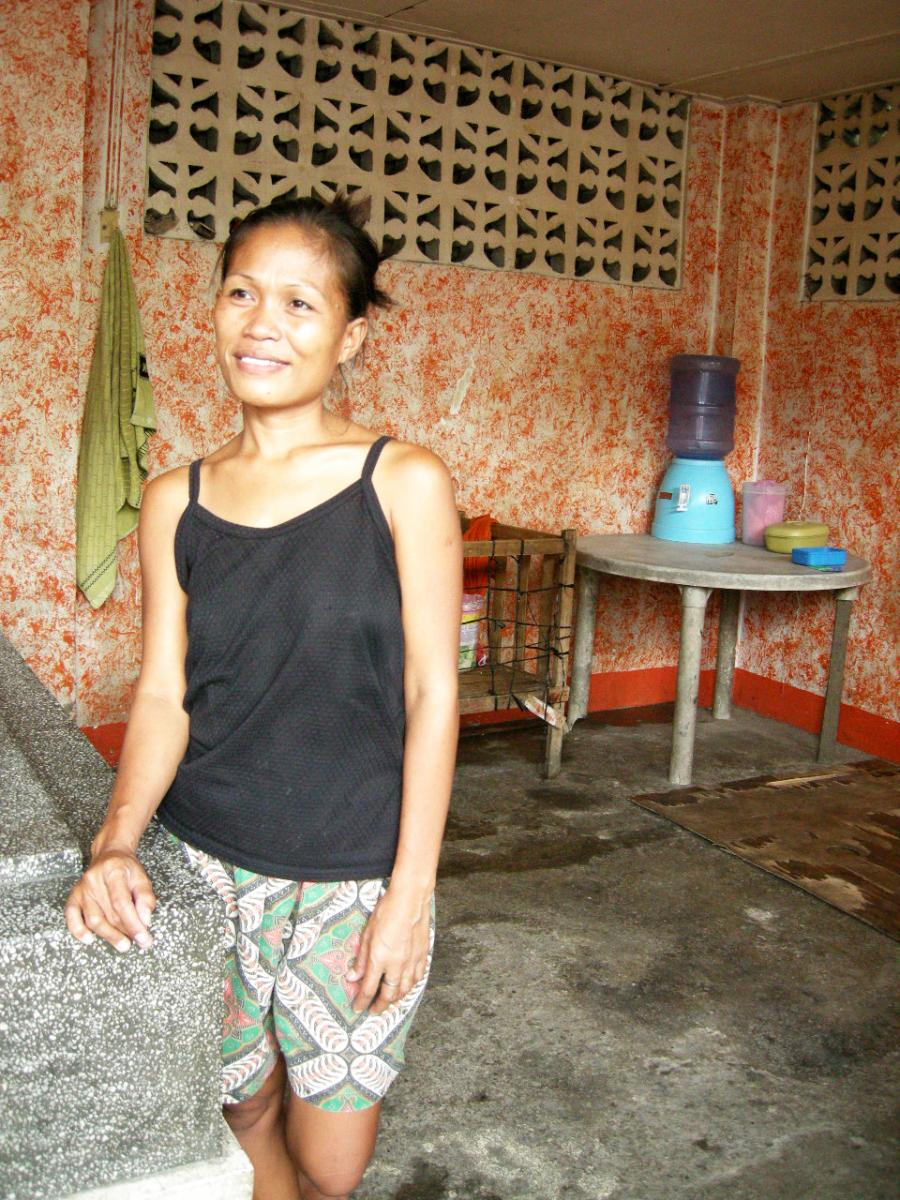
My partner and I are afraid. We don’t have anywhere to go. We don’t have money to pay for rent.
What was it like to live in the cemetery?
We had our friends in the cemetery. We knew everyone.
Has Children of Asia helped you?
Yes. CoA pays for Leanfi’s school fees, for her projects and tutorials; it’s fun for Leanfi to be in the programme with the other children. Also, we receive rice from CoA. We can speak with the social workers, in times of crisis, and they listen to our needs and try to find ways to help us.
Could you describe me what is a good day for you?
When there is food left over from a funeral at the cemetery.
Could you describe me what is a bad day for you?
When my children are sick, and when we don’t earn any money.
What is your biggest wish in life?
It is to own a house.
What are your children’s wishes?
My daughter wants to study computer science.
What is your best memory?
When I was on good terms with my mother. We are not on good terms anymore. Most of my siblings are not on good terms with my mother. It is problematic and my mother doesn’t listen.
What is the nicest thing someone ever did for you or told you?
It was when the social workers (of CoA) said they would accept Leanfi into the education programme.
Vicenta W. Mayor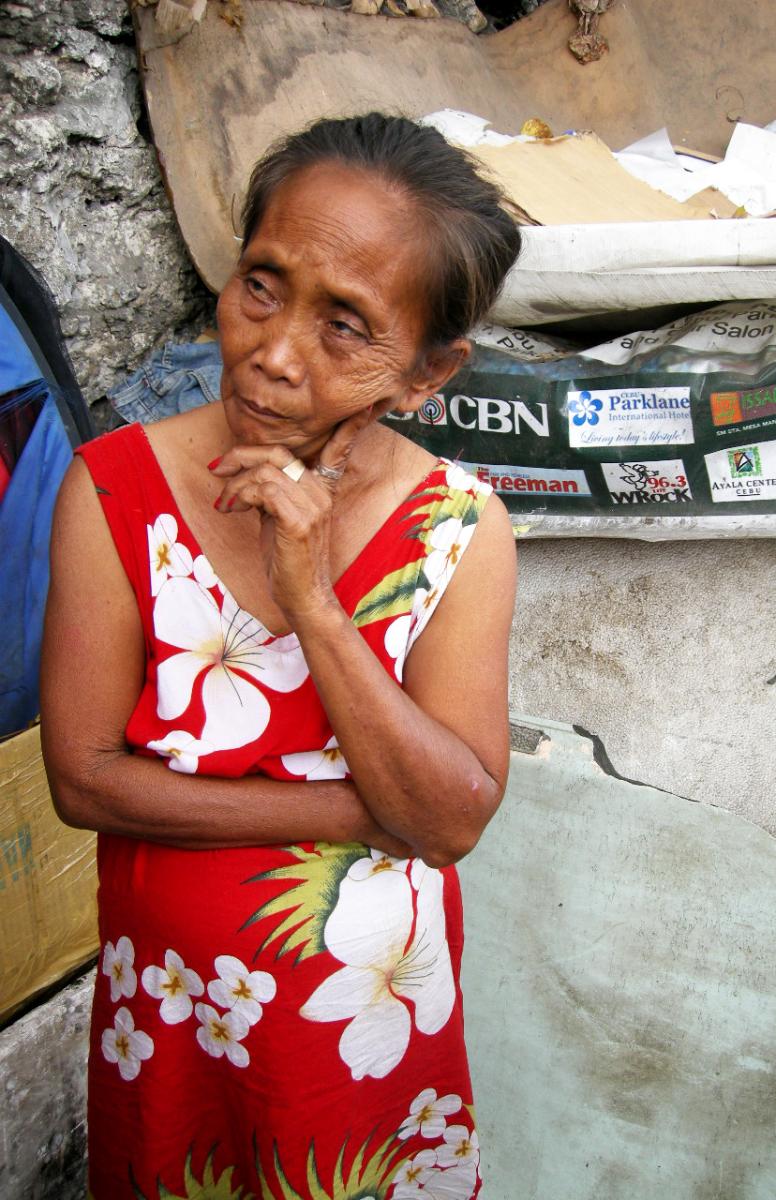
How old are you?
62 years old.
Where were you born?
Albuera Leyte, Philippines.
Are you married/ widowed/ single?
Widowed.
How many children do you have?
I had three children, but one died.
If you have children, how many boys and how many girls do you have?
They are all girls. Three girls. My daughters are aged 32 and 25, and I also take care of my granddaughter, who is 10 years old.
Did you go to school? If yes, until which grade did you go to school?
Yes, I went to school until the end of elementary school. Up until grade 6, when I was aged 12. I stopped because my family didn’t have enough money.
My father was a farmer. My mother didn’t work.
How long have you been living in the cemetery?
I have been living in the cemetery for 32 years.
Where did you live in the cemetery?
I lived in one of the mausoleums.
What do you do to earn money and take care of your family?
I work as a prayer teacher.
Do you have access to:
- Running water? NO.
- Electricity? NO.
- Sanitation? NO.
Do you have children in one of the children of Asia programmes? If yes, how many?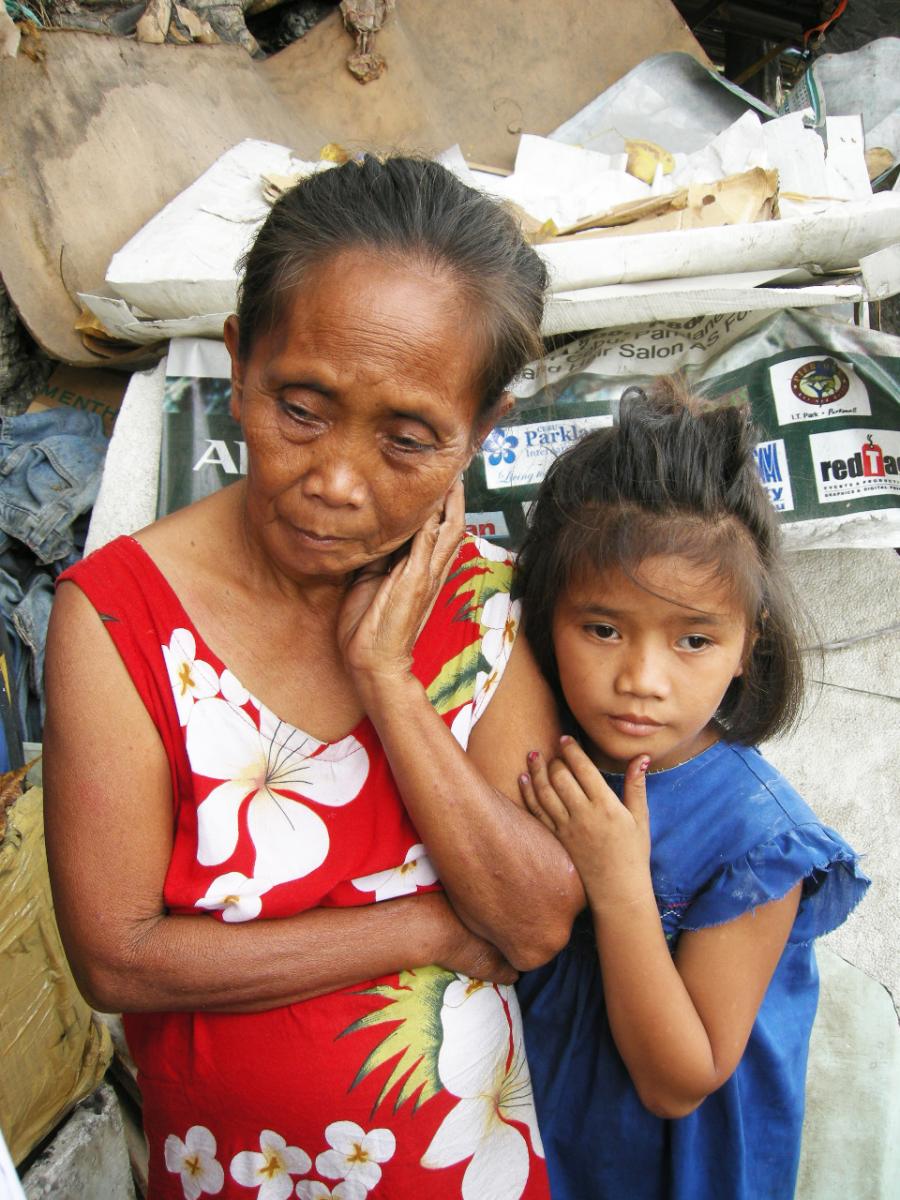
My granddaughter, Mary May, who is 10 years old, is in the program.
Did you receive any micro-finance loans?
I received one loan of 1,000 pesos.
How many months did you have to repay the loans?
1 month.
What did you do with the loan money?
I used it to buy candles, which I could then sell.
Did the loan help?
I earned more money thanks to the loan. It helped me so I could provide more food for my family.
Can you explain your budget? How much do you spend daily for food and water? How much is your income per month?
I make 250 pesos every Monday and 50 pesos the other days. I earn 2000 pesos per month. I spend 60 pesos at a time for food, for rice, meat or fish. Water costs 40 pesos per container. I spend 11 pesos per month for soap. I don’t spend money on clothes because I’m given second-hand clothes.
How many hours a day do you work?
I work from 7am to 6pm.
How has life changed since you left the cemetery?
Now I’m renting a room for 500 pesos per month. It was better in the mausoleum. It was bigger. I miss the food from the funerals.
What was it like to live in the cemetery?
I miss my friends.
How much did children of Asia helped you?
Children of Asia helped me somewhat by helping Mary May to go to school.
Could you describe a good day for you?
A good day is Monday because it’s the burial day.
Could you describe a bad day for you?
The bad days are Fridays and Wednesdays because there are no customers.
What is your biggest wish in life?
It is to own a small hut, so nobody will take away my home.
What are your children’s wishes?
My grandchild would like to go to High School and college.
What is your best memory?
My coming to the cemetery every Monday is my best memory.
What is the nicest thing someone did for you or told you?
It is when someone asks me to lead the prayer because they tell me I do it nicely.
© Women’s WorldWide Web 2010













